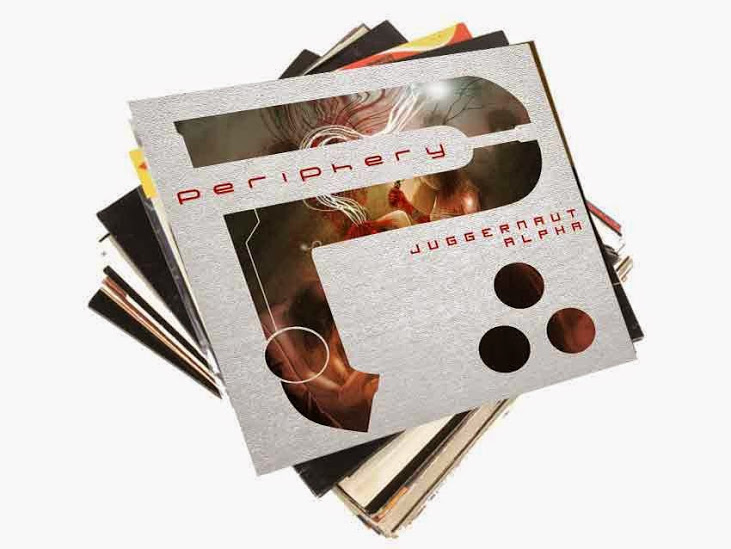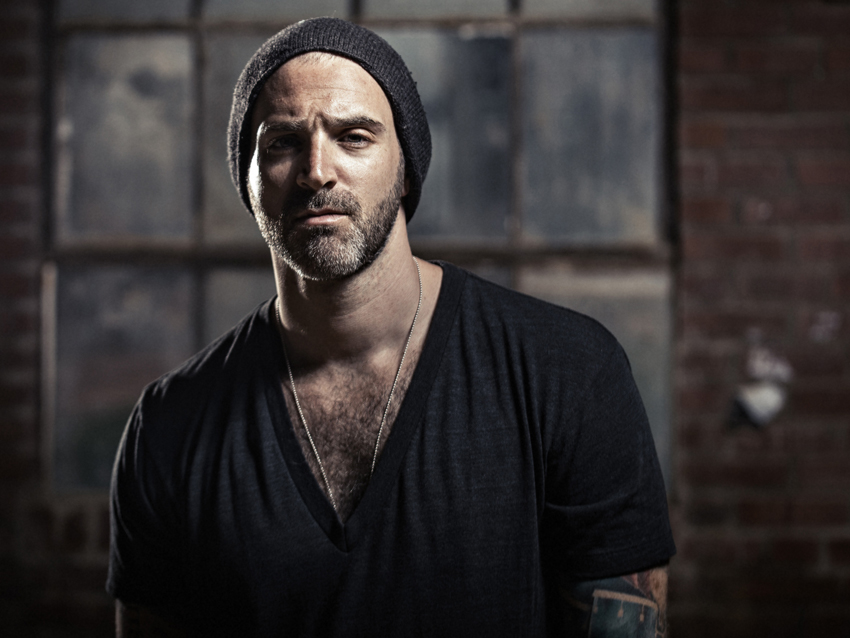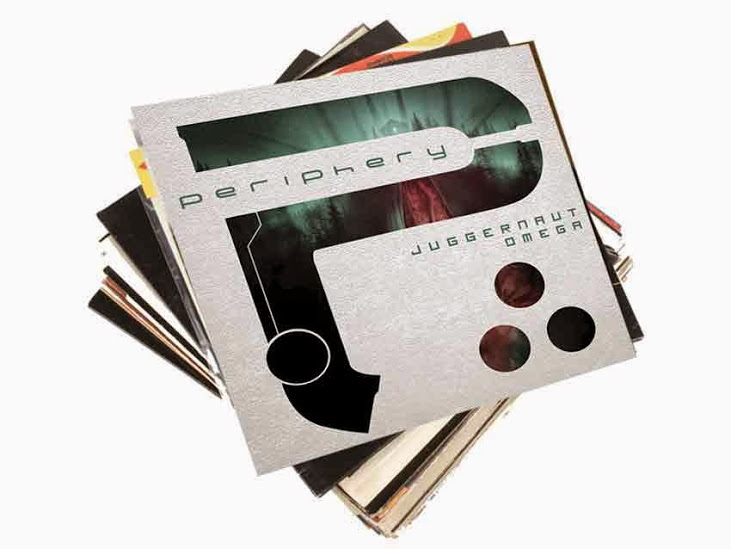
Misha Mansoor and Matt Halpern on Periphery's bold new concept albums
None of the members of the six-man, DC-based progressive-metal band Periphery knew where they were headed when they went into the studio to record their third album - or make that third and fourth albums, as the fruit of their labors, 17 songs in all, will be released as two separate discs titled Juggernaut: Alpha and Juggernaut: Omega.
“We’ve always had grand plans and ideas, but I think we outdid ourselves this time around," says drummer Matt Haplern. "There’s a story that spans both albums, so they are connected in that way. Releasing them as two albums made sense to us from a music-digestive standpoint. We want our fans to really experience the songs fully, and if we gave them too much on one record, it could become a blur. Spacing things out will hopefully give everybody the full picture.”
Surprisingly, there could have been more. Says lead guitarist Misha Mansoor, "We actually cut things down. There were so many demos floating around. We just wrote and wrote and wrote. It became apparent that we were going to have a long piece of work, and at a certain point the best songs started to rise up and make themselves known. And there were a lot of surprises, too; songs you didn't think would make the cut became some of our favorites."
Mansoor describes the writing and recording of the Juggernaut albums as "a hugely collaborative process," as opposed to the group's first two releases on which he did most of the writing, arranging and producing. "This time, we really worked as a band, which is what we’ve wanted all along," he says. "It was only now that we had a lineup that could work like that. People contributed a lot of ideas, not just those specific to their own instruments and parts."
Although Periphery is still a young band, its members have already been hailed for their highly evolved instrumental skills. Both Halpern and Mansoor stress that technical flash took a back seat to textures and moods on the Juggernaut albums. “In the past, we probably tried to push the boundaries of musicianship and were really into the super-technical side of things," Halpern observes. "On these albums, we went in the opposite direction. Story, songs, overall feel – those were the big concerns. If there were parts that required technical challenges, so be it, but that wasn’t the goal."
“If I pushed myself in any way, it was toward restraint," says Mansoor. "For us, writing riffy, notey stuff comes easily – it’s not very hard. I’ve been challenging myself with creating a whole world of sound. For something as epic as Juggernaut, I tried not to overcrowd the songs with so many notes.” He pauses, then adds with a laugh, "But there's still a lot of intense playing on the records. I don't think anybody's gonna feel shortchanged in that department."
Periphery's Juggernaut: Alpha and Juggernaut: Omega will be released on January 27. You can pre-order physical copies at Summerian Records. Digital copies can be pre-ordered via iTunes for Juggernaut: Alpha and Juggernaut: Omega.
On the following pages, Misha Mansoor and Matt Halpern go through both albums track-by-track.

A Black Minute
Misha: “So here we kick off the Alpha album. This one is pretty interesting. Mark was over one day while I was editing or programming some stuff, and he started jamming. I heard something he did, looked over at him and said, ‘Wow, that’s pretty cool. Don’t forget that.’
“We started recording it, and then my computer crashed. I lost everything, including the whole album. It ended up being fine – I took my computer to get fixed and got back most of what was on it. This track was lost, though, so we had to recreate everything we thought we’d done.
“It has a lot of Mark’s basic riffs in it, and I sort of filled in other parts. We didn’t want a real ‘intro song,’ but it works as an intro to the album, if that serves as a distinction.”

MK Ultra
Matt: “I think people will like how this track blasts out of the first song. It hits you right in the face and gives you a nice kick in the head. We’ve actually had this one sitting around for a while. It was a demo that Misha wrote – the first minute or minute and a half of it. I pushed for us to do it – it’s definitely one of my favorites.
“As a drummer, it was one of the most challenging songs on the record, although it’s pretty short. So while it’s a hard song to play, but a great song to listen to. [Laughs] Playing a ‘swung’ sort of feel throughout gave it a very particular kind of sound, so nailing that and making sure all the accents were right took a lot of effort. There’s some really cool turnarounds in the track that I’m proud of. I think listeners will have fun with the whole thing.”

Heavy Heart
Misha: “This song came together and sounded pretty accessible. We don’t really think about our music in those terms, though. Most of Heavy heart is actually very proggy – the intro and verses are in this odd-time, and then it’s straight-ahead in the chorus. Then it goes into 'adventureland' with a lot of cool guitar work.
“It’s very melodic and catchy, because everyone in the band loves catchy parts. I don’t think it’s a contender for radio play, because it’s long and it does have the proggy stuff. We're excited about playing it. A lot of collaboration went into recording it.”
The Event
Matt: “The other guys would have different perspectives on this song. Personally, I wish that we could have developed it further; maybe there’s some themes in it that we’ll explore in the future. Hard to say.
“It’s like a palette cleanser, if you will. It’s short and simple in its repetitive nature. It’s supposed to represent a vibe, a feel, a theme for the record rather than being considered a full-on song. It’s fun to play. I think we’re going to use it as an interlude between songs in our set. I’m excited to be jamming it, for sure.”

The Scourge
Misha: “This is the song that we put out first, and I think it threw people for a loop. It’s very different from anything else on the record, and it’s also very different for us in general. The reason why we thought it would be cool to put out was that it showed a bit of what the album has to offer. It goes through all of these movements, recurring themes and motifs, and it takes you on a journey.
“It’s one of the first songs that we demoed and wrote. Right off the bat, we realized that it led us in the direction we wanted to go in terms of mood and vibe. It’s darker and theatric.
“The whole thing came about in a funny way: I was driving, and suddenly I had this idea for a song. I didn’t even know if it would be a Periphery song at the time. I demoed it and sent it off to everyone, and they liked it – I wasn’t expecting that. Then Spencer demoed vocals for it, and that’s when it came together – really quickly, too.”

Alpha
Matt: “When we were demoing, this wasn’t called Alpha – we had other names for it. We weren’t looking at any of the tracks to be commercial or radio songs, but once Spencer wrote the words for this, because it has a very approachable chorus, it seemed to stand out as something that could get on the radio.
“The message plays a big part in the story, so this song is important to the overall theme and feel of the record. But it’s cool that it’s a very accessible track that could get our genre and band in front of some new ears. It’s such a cool one. I’m really proud at how it turned out.”
TYPE: YouTube | CAPTION: null | SRC: https://www.youtube.com/watch?v=K-BFadGJ3Kc&feature=youtu.be | WIDTH: 460 | HEIGHT: 370. (Click the Edit Attributes/Cog button with cursor placed in this area to edit this tag.)

22 Faces
Misha: “There’s a lot of riffs in this song. It came about in a weird way: I had the demo lying around; it was sort of unfinished, but I knew it had potential. I wanted it to be this non-stop driving sort of thing – that’s just the mood I was in at the time. I was writing all the riffs without much of a care for how we’d play it live, and we ended up with a song that will require a lot of practice for the stage.
“Arrangement-wise, it was a real labor of love; we all put a lot of work into it. Jake contributed a section, along with a solo that really brought it home. Before that, I thought it was just too samey – it didn’t hit all the marks that I wanted it to. Spencer did a knockout job on it, too. It went from being this song with so much potential to now one of my favorite tracks on the whole album. And it really came down to the last 10 percent. We were mostly there, but we just couldn’t nail it for a while. When we finally got it, it was such a relief.”

Rainbow Gravity
Matt: “This is another favorite of mine. Misha wrote the main riffs for this, and again, like some others, it was sitting around a while. As I was learning and digesting the demos, I was also in the process of rereading The Shining by Stephen King, and I felt as though the themes and vibe of the book helped to create a backdrop for the story of the song.
“As we were writing the other songs for Juggernaut and putting together the concept, this track communicated a very specific and important vibe that fit the story very nicely. I should stress that the story isn’t about The Shining, but it’s a feeling; it paints a nice picture and creates cool images in your head.
“I remember going to the studio to hear what Spencer had done with his vocals, and I was blown away by his energy and power. It’s a very commercial song on first listen, but for me it’s just a real vibe driver.”

Four Lights
Misha: “It’s one of those songs on which we explored the vibe of the story. It’s a demo I put out earlier – I kind of previewed it – but then I added to it as a way to bring back some themes, a sort of foreshadowing, if you will.
“It’s a bit of a break from the singing. It gives you some space and lets you chill. It was going to be a vocal song initially, but as we were completing it, we thought, ‘No, let’s just keep it short and sweet.’ It comes at a good spot in the story, right before a big shift.”
Psychosphere
Matt: “We wrote this song to be very moody and atmospheric, very droney and slow. Initially, the only thing that was written was the first minute or minute and a half, the riff. Slowly, we worked on it and built it up into a complete song.
“It’s a great track to end the first record, the first half of Juggernaut. It’s the perfect middle song for the story. It’s epic, it’s vibey – a real chance for people to sit back and get lost in sound. It doesn’t make you feel angst of any kind; you feel the music surrounding you more than pushing you.”

Reprise
Misha: “This reprises the Black Minute theme. It’s sort of a lead-in to the next album. The next big shift is about to occur, and so this guides you in.”
The Bad Thing
Matt: “This is another of my favorites – I could say that about so many of these songs. Like it was with Rainbow Gravity, I was reading The Shining while learning and writing this one. There’s a reference to ‘the bad thing’ in the book – Danny Torrence was talking about his father drinking. That doesn’t have anything to do with the title of our song; it’s just a funny coincidence.
“Titles are weird for us: Most of the working titles on the demos are eventually changed. This time, we kept the demo title for the finished version. The song is angry and pissed off, and the lyrics depict a lot of violence. It’s heavy, it’s loud, and it sounds just like the title describes. There’s a lot of gut-wrenching stuff, and it grabs you where it counts.”

Priestess
Misha: “This is a weird song. It’s another one that started out with Mark jamming on some riffs. At first, I thought, ‘Oh, he’s just bored, so he’s doing whatever.’ But if I hear something that perks up my ears and distracts me from what I’m working on, I know it’s pretty good.
“Mark hadn’t really fleshed it out. I was like, ‘Hey, what’s that?’ And he said, ‘I don’t know, man.’ So I said, ‘Well, it’s good. Let’s figure it out.’ We worked on it, and before you knew it, it became the basis for the song.
“From this point, Mark was writing more. It took a while to work out the vocals and to get a nice flow, but in the end it wasn’t as hard as we thought it would be. Given how different the demo is from the final song, one might thing that it was more difficult than it actually was. Spencer’s vocals lift the whole thing up.
“Originally, this song wasn’t going to have an acoustic part, but we had access to an acoustic and decided to try it out. When we heard it, we were like, ‘All right, it works. There it is.’”

Graveless
Matt: “As far as the riffs go, Graveless is probably the most technical song on the records. The variations of the grooves might sound a little over the top, but they’re actually quite simple. We tried a lot of other ideas and different parts that didn’t make it, and we felt that, as is, it’s a short one, a banger, and so we went for it.
“Our fans like our more technical-sounding and energetic tracks, so this one is kind of custom-built for them. The musicians in our audience are always stoked to learn the riffs, so I think Graveless will give them something to work on. It’s a lot of fun to play, and I’m looking to doing it live. It’s a great circle pit song.”
TYPE: YouTube | CAPTION: null | SRC: https://www.youtube.com/watch?v=ON6UDBNmZY0&feature=youtu.be | WIDTH: 460 | HEIGHT: 370. (Click the Edit Attributes/Cog button with cursor placed in this area to edit this tag.)
Hell Below
Misha: “This is a part of the story that needed something crushing. It’s tuned absurdly low – it’s almost a parody of itself in that way, entirely for effect. The bass is tuned even lower, not even to be audible, but just to shake the mix. It’s supposed to be an all-out slow song, something that would be a lot of fun to play live.
“That smooth-jazz part at the end is a bit of a transition. After all of that heaviness, it needed a palette-cleanser. When we play it live, it won’t have that section at all, but it does work as a nice transition.
“On any other Periphery record, I don’t know if this song would’ve made the cut. It’s noisy and messy, but it works in the scheme of the concept. That’s what really excited us about doing this album, or albums – it forced us to go in new directions.”

Omega
Matt: “It’s a doozy. Initially, it was two separate songs, or two separate ideas, I should say. Nolly wrote the first batch of riffs, and then Mark came up with the second half. Then Misha and Jake sort of filled everything in.
“We’ve written some long songs before – this one comes in a little bit shorter than our previously released longest song. I don’t think the goal was ‘Hey, let’s write a really long song.’ The guys in the band just a very clear idea of what they wanted to do. They wanted this extended tale that takes you up and down and through various peaks and valleys.
“In the sequence of the story, Omega represents the character’s death and rebirth. It’s very aggressive in the beginning, and then it gets very down and becomes ominous, and then it gets back up and slams it. At the end, although the character might have found some piece, what he’s left in his wake is disarray and a violent remains.”
Stranger Things
Misha: “The song was unfinished when we went to work on the album; it was a minute or two, maybe, just an inkling of an idea. We didn’t know that it would be the album closer, but as we were going through the demos, Spencer said, ‘This one has to be the last song on the record.’ As a result, we ended up making it more epic.
“It’s got a lot of the themes that were throughout the record. Funny to think that something that was so small of an idea turned into this grandiose piece. So many times we’re in that same position, and nothing ends up happening; you get kind of stuck. This one surprised us by how big it got.”
Joe is a freelance journalist who has, over the past few decades, interviewed hundreds of guitarists for Guitar World, Guitar Player, MusicRadar and Classic Rock. He is also a former editor of Guitar World, contributing writer for Guitar Aficionado and VP of A&R for Island Records. He’s an enthusiastic guitarist, but he’s nowhere near the likes of the people he interviews. Surprisingly, his skills are more suited to the drums. If you need a drummer for your Beatles tribute band, look him up.

